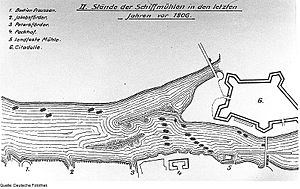Siege of Magdeburg (1806) facts for kids
Quick facts for kids Siege of Magdeburg |
|||||||
|---|---|---|---|---|---|---|---|
| Part of The War of the Fourth Coalition | |||||||
 A map of the fortified city of Magdeburg in 1806. |
|||||||
|
|||||||
| Belligerents | |||||||
| Commanders and leaders | |||||||
| Strength | |||||||
| 16,000-25,000 men | 24,000-25,000 men 700 artillery pieces |
||||||
| Casualties and losses | |||||||
| light | entire garrison and 20 generals P.o.W. 54 flags, 700 artillery captured |
||||||
The Siege of Magdeburg was a big military event that happened from October 25 to November 8, 1806. It was part of a larger conflict called the War of the Fourth Coalition. During a siege, an army surrounds a city or fortress to cut off its supplies and force it to surrender.
In this siege, the French army, led by Michel Ney, surrounded the city of Magdeburg in Prussia. Magdeburg was a very important city for Prussia. The Prussian forces inside the city were commanded by Franz Kasimir von Kleist. In the end, the French army won, and the Prussian soldiers had to surrender. The French took control of Magdeburg on November 11, 1806.
The Siege Begins
After two major battles, Jena and Auerstedt, the French army was very successful. They chased the remaining Prussian soldiers. Some of these Prussian troops, led by Prince Hohenlohe, headed towards the strong city of Magdeburg.
The French commander, Marshal Joachim Murat, asked Prince Hohenlohe to give up. But the Prince refused and managed to escape from the city. Command of the Prussian forces inside Magdeburg then went to General Kleist. He had a large group of about 25,000 soldiers.
French Forces and Strategy
At first, the French army had more soldiers than the Prussians defending Magdeburg. However, the French leader, Emperor Napoleon, called back some of his troops. This left Marshal Ney and his 18,000 soldiers to continue the siege.
Marshal Ney's troops surrounded Magdeburg on both sides of the Elbe River. But Ney did not attack with much force. The fighting was mostly small skirmishes, which are minor fights between small groups of soldiers.
Prussian Resistance and Surrender
General Kleist tried to keep his soldiers' spirits up. He famously said he would only surrender Magdeburg if his handkerchief caught fire in his pocket! However, the French were getting ready for a full-scale attack with lots of cannons.
Facing the threat of a huge bombardment, the Prussian leaders decided to talk about peace. They agreed to a ceasefire on November 7. The very next day, the Prussian soldiers officially surrendered. They left the fortress on November 11 and became prisoners of war.
 | Kyle Baker |
 | Joseph Yoakum |
 | Laura Wheeler Waring |
 | Henry Ossawa Tanner |

